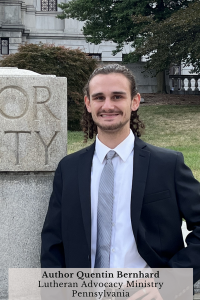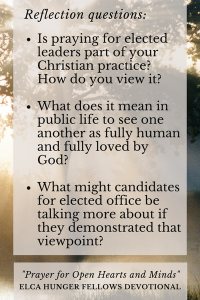Each month ELCA Worship highlights resources and events from other organizations and institutions. These Lutheran and ecumenical partner organizations work alongside the ELCA to support worship leaders, worship planners, musicians, and all who care about the worship of the church.

Music that Makes Community (MMC) practices communal song-sharing that inspires deep spiritual connection, brave shared leadership, and sparks the possibility of transformation in our world.
Music that Makes Community announced a leadership transition in November. After 8 years of serving as MMC’s Executive Director, Paul Vasile discerned it was time for a new adventure. We are grateful for his service and all the ways he grew this community of practice and shared resources so generously. To succeed him, the Board of Trustees hired Conie Borchardt, a long time MMC practitioner and facilitator. Please join us for Coffee Hour (10a ET) and Happy Hour (5p ET) on Monday, Jan. 15 to meet Conie.
To support you in planning your Lenten experiences this year, MMC is offering three virtual gatherings. On Friday, Jan. 15, 3:30p ET, there will be a hybrid Lenten Resource workshop offered live from Albuquerque, N.M. (1:30p MT) which will be recorded and available for later purchase. (If you’re local to ABQ, please join us in person!) On Thursday, Feb. 1 (2:30p ET) and Monday, March 4, (4p ET) there will be Drop-In spaces with MMC leaders to explore and envision meaningful experiences for the Lent arc from Ash Wednesday to Easter. The latter will specifically focus on Holy Week and Easter. As always, our facebook group is an ever present place to start and continue conversations about creative liturgical music practices.
Our facilitators, Breen Sipes, ELCA pastor, and Charles Murphy will be leading music and offering a plenary at the Messy Church conference in Chicago in April. Charles will be leading a 1/2 day workshop in Birmingham, AL on Sunday afternoon, Feb. 4. Practice groups continue in Chicago and Albuquerque and monthly community sing/song circles are starting in central Washington state and Indianapolis. In addition to these in-person events, Monday Morning Grounding is currently meeting on Zoom at 10a ET until March 4. Please visit our website calendar for more details!
May the Song support and nourish you during this little green time between Advent and Lent. Please be in touch at hello@musicthatmakescommunity.org and keep singing.

Transforming and connecting lives through faith and music since 1981.
It’s time to nominate students for Lutheran Summer Music
Each year, the primary way that music students find their way to LSM is through the encouragement of their church musician! LSM offers opportunities for musicians of all kinds: brass, winds, strings, percussion, piano, organ, voice, harp, guitar, handbells, and more! Students receive advanced musical instruction through large ensembles (Festival Choir, Band and Orchestra), chamber music, private lessons with collegiate-level faculty, and elective classes (such as conducting, composition, church music, intro to the pipe organ, jazz band, musical theatre, music therapy). In the evenings, students attend recitals and Evening Prayer services, and social events with their friends.
LSM 2024 takes place at Valparaiso University in Indiana from June 30-July 28 (Full Session) or June 30-July 14 (Half Session) and is open to students who have completed grades 8-12. Know a musical young person who would thrive at LSM? Nominate them today.
ALCM nurtures and equips musicians to serve and lead the church’s song.
Ponder Anew: a continuing education conference for church musicians, pastors and worship leaders
July 22-25 at Valparaiso University
With an emphasis on practical skill-building, you will be able to attend workshops and in-depth learning sessions on a variety of topics. Early registration closes March 19. Additional information about the conference, including pricing, scholarships, and accommodations, is available on the ALCM website.
An ecumenical conference on liturgical renewal for the church today.
Creation, Not Commodity: The Church’s Liturgy in a Consumer Culture
Consumer or market culture’s role in our lives is so ubiquitous that we frequently fail to recognize its presence and influence over us. Even committed church folk will talk about “church shopping” when they move to a new location.
In its 75th year, the Institute will turn its attention to this phenomenon. It will be held April 9-11, 2024 (note start date is one day later than usual). Sign up for registration updates and other news from ILS.
Augsburg Fortress is an imprint of 1517 Media, the publishing ministry of the Evangelical Lutheran Church in America
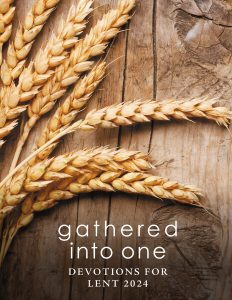
Gathered into One: Devotions for Lent 2024
Gathered into One provides daily devotions for each day from Ash Wednesday to the Resurrection of Our Lord/Vigil of Easter (traditionally known as Holy Saturday). Devotions begin with an evocative image and a brief passage from First Corinthians. The writers then bring their diverse voices and pastoral wisdom to the texts with quotations to ponder, reflections, and prayers. The apostle Paul writes First Corinthians after hearing of quarreling and divisions among the people, emphasizing a theme of unity amid diversity is as timely now as it was when Paul was writing.
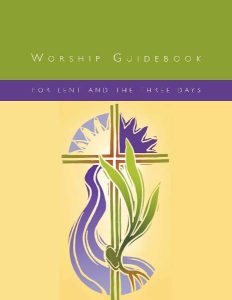 Worship Guidebook for Lent and the Three Days
Worship Guidebook for Lent and the Three Days
An essential companion resource to the Worship Guidebook, this collection greatly expands the repertoire of resources for the song of the assembly and its leaders during the days from Ash Wednesday to Easter. Most materials are reproducible and newly composed in a broad range of styles. Spiral-bound, includes a CD-ROM with assembly and instrumental parts.
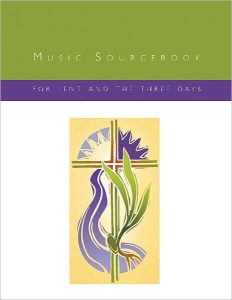 Music Sourcebook for Lent and the Three Days
Music Sourcebook for Lent and the Three Days
This guidebook is a treasure trove of insights, images, and practical tips to help deepen your congregation’s worship life during the days from Ash Wednesday to Easter. An essential companion to the guidebook is the Music Sourcebook.

New Music for Lent, Easter, and Spring
Check out new music for Lent, Easter, and Spring from Augsburg Fortress. A piece that may become a new favorite is “Dust, Remember You Are Splendor.” Susan Palo Cherwien’s poetry brings new imagery and depth to the traditional Ash Wednesday themes of dust and repentance. In this setting for SAB choir, composer Anne Krentz Organ beautifully writes original music which underscores the hopeful and contemplative text. The assembly can be invited to join on the last stanza as well.
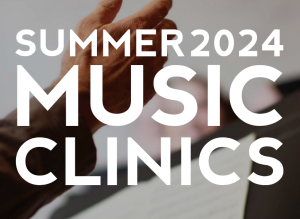
Save the Date for Augsburg Fortress Summer Music Clinics
Join clinicians David Cherwien and Mark Sedio for Augsburg Fortress’ free summer music clinics this summer in any of our five locations! Registration information is still forthcoming, but now is the time to save the date:
July 16-17 in St. Paul, Minn
July 19-20 in Columbia, S.C.
August 1-2 in Philadelphia, Pa.
August 5-6 in Columbus, Ohio
August 9-10 in Chicago, Ill.
Who plans worship in your congregation? Perhaps roles are shifting, and a common framework would be helpful. Or you’re trying a new worship service but want to keep the essential elements centered. Luther Seminary’s Faith+Lead has a new on-demand course A Lay Leader’s Guide to Planning Worship Experiences ideal for equipping individuals or groups to faithfully design worship that grows along with your community’s needs. Integrating multiple learning styles, this course will help you connect your understanding and hopes for worship.
An interdisciplinary study and ministry center that promotes the scholarly study of the theology, history, and practice of Christian worship and the renewal of worship in worshiping communities across North America and beyond.
The Vital Worship, Vital Preaching Grants Program at the Calvin Institute of Christian Worship is designed to foster, strengthen and sustain well-grounded worship in congregations Grants to worshiping communities stimulate thoughtful and energetic work that will result in worship services that exhibit renewed creativity, theological integrity, and relevance. Learn more about Worshiping Communities Grants. The deadline for this round of proposals is October 15. Future dates for submissions include Feb. 15 and June 15, 2024.
 Journey to Baptismal Living (JBL) announces the launch of its new website journeytobaptism.org, on Nov. 15. Founded as the North American Association for the Catechumenate in 1993, JBL remains an organization committed to providing training and resources for those who guide formation in Christian discipleship with individuals both unbaptized and baptized. The redesigned website offers insights and strategies for facilitating discernment, worship, instruction, and reflection, as well as advice on how to form a team and mentor sponsors. Primarily, the new website is a place to connect: to arrange for practitioner training and for ongoing development through monthly blogs and frequent community chats.
Journey to Baptismal Living (JBL) announces the launch of its new website journeytobaptism.org, on Nov. 15. Founded as the North American Association for the Catechumenate in 1993, JBL remains an organization committed to providing training and resources for those who guide formation in Christian discipleship with individuals both unbaptized and baptized. The redesigned website offers insights and strategies for facilitating discernment, worship, instruction, and reflection, as well as advice on how to form a team and mentor sponsors. Primarily, the new website is a place to connect: to arrange for practitioner training and for ongoing development through monthly blogs and frequent community chats.
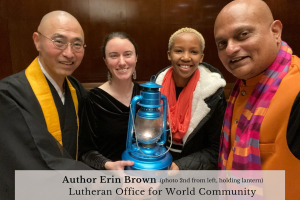
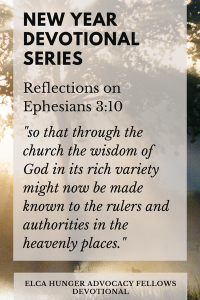 Since October, the Lutheran Office for World Community (LOWC) has participated in weekly prayers for peace at the Church Center for the United Nations. At every service, we lift up prayers for all people impacted by violence and destruction caused by the numerous conflicts happening worldwide. At a recent service, members of an organization called Flame of Hope led the reflection, bringing with them a lantern illuminated with a flame recovered from the aftermath of the atomic bomb drop in Hiroshima in 1945.
Since October, the Lutheran Office for World Community (LOWC) has participated in weekly prayers for peace at the Church Center for the United Nations. At every service, we lift up prayers for all people impacted by violence and destruction caused by the numerous conflicts happening worldwide. At a recent service, members of an organization called Flame of Hope led the reflection, bringing with them a lantern illuminated with a flame recovered from the aftermath of the atomic bomb drop in Hiroshima in 1945.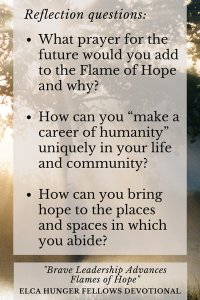 LOWC, along with many faith-based organizations advocating at the United Nations, have been attending meeting after meeting there focused on the consequences of global conflicts. Systemic issues around the world continue to violently divide us all. And without leaders intentionally addressing the root causes of these conflicts, it becomes ever more clear that the violence we constantly witness will vociferously propagate. Two weeks ago, the International Crisis Group posted an article listing ten conflicts to watch this year, pointing to the fact that more and more global leaders are using military force. And while diplomatic efforts to end fighting are failing worldwide, there is a growing belief these leaders using military force can get away with it.
LOWC, along with many faith-based organizations advocating at the United Nations, have been attending meeting after meeting there focused on the consequences of global conflicts. Systemic issues around the world continue to violently divide us all. And without leaders intentionally addressing the root causes of these conflicts, it becomes ever more clear that the violence we constantly witness will vociferously propagate. Two weeks ago, the International Crisis Group posted an article listing ten conflicts to watch this year, pointing to the fact that more and more global leaders are using military force. And while diplomatic efforts to end fighting are failing worldwide, there is a growing belief these leaders using military force can get away with it.

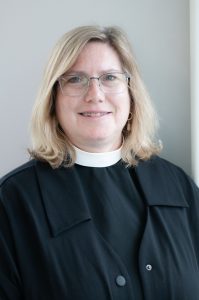


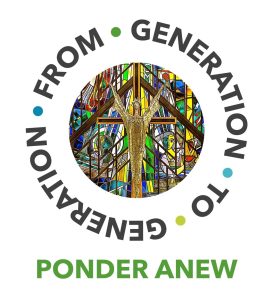


 Worship Guidebook for Lent and the Three Days
Worship Guidebook for Lent and the Three Days Music Sourcebook for Lent and the Three Days
Music Sourcebook for Lent and the Three Days


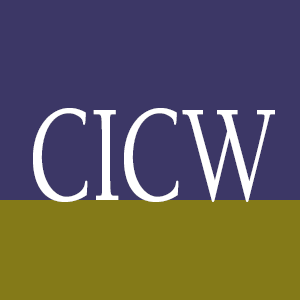
 Journey to Baptismal Living (JBL) announces the launch of its new website
Journey to Baptismal Living (JBL) announces the launch of its new website 
 Sing
Sing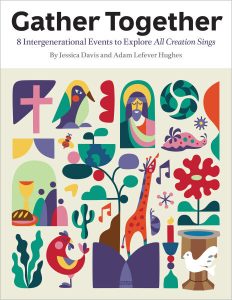 Discover
Discover 